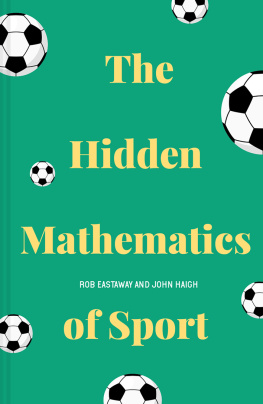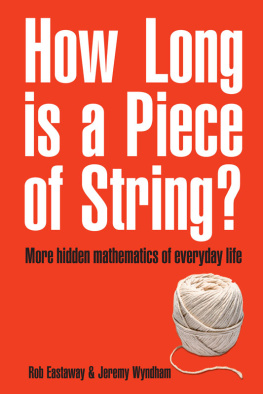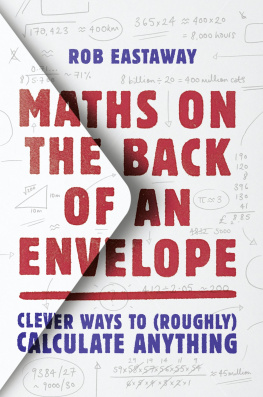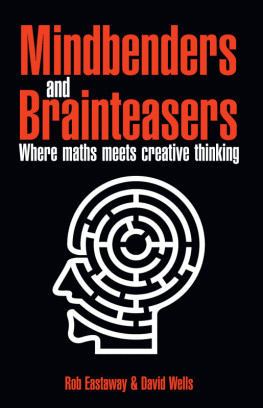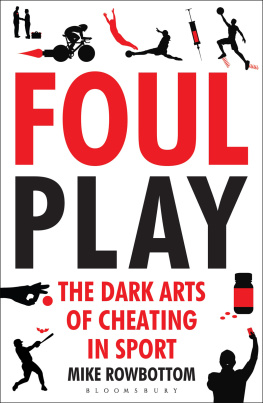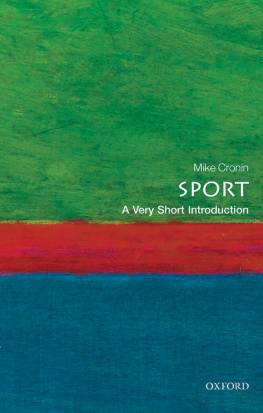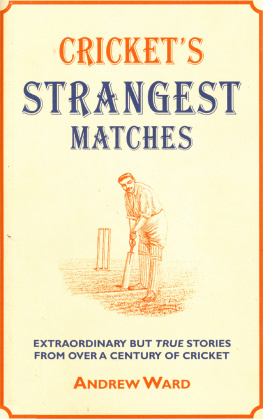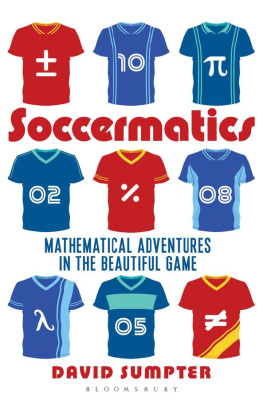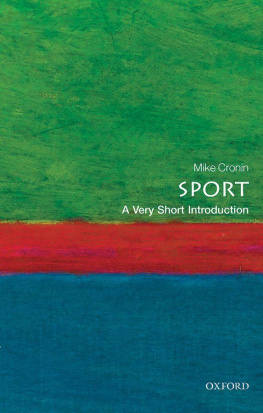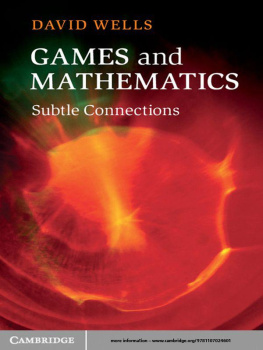Contents
Guide


CONTENTS
How to Win More Gold Medals
And how many medals your country might expect
Why Didnt You Belt It, Son?
When sport meets game theory
A Matter of Perspective
Spectators, players and referees see things differently
Chasing the Ace
The best servers should practise their returns
Top of the League
The facts and foibles of league tables
The Ball is Not Round
Why not-quite spherical is the norm
Faster, Higher, Longer
The maths of record breaking
The Toss of a Coin
The influence of heads and tails
One Hundred and Eighty!
Where to aim on the dartboard
Getting the Angles Right
Snooker and friends an elliptical excursion
Eleven, Twenty-two and other Sports Numbers
Numbers and numerology in sport
Goals, Goals, Goals
The patterns that can predict results
The Percentage Game
Play safe or take a gamble?
Adding to the Thrill
Ways to make sport more exciting
In the Judges Opinion
The problems of subjective scoring
Say it aint so, Joe
Cheating to win and cheating to lose
Extra Time and the Penalty Shoot-out
How to end the game
PREFACE TO THE NEW EDITION
The sports world is very coy about its interest in mathematics. Commentators will play down their ability to do mental arithmetic. We even heard one apologise after converting the speed of a tennis serve from kilometres per hour to miles per hour! And any discussion in which the maths goes deeper than that will invariably be sidelined as geeky.
And yet the fact is that most participants in sport are mathematicians. They have to be, because sporting success and failure are predominantly measured using numbers, and also because many of the tactics essential to a competitor require logical, analytical thought that is, essentially, maths. It may not be maths in the form that we did it at school, but the nature of the thinking is just the same.
A snooker player starting a break might not consciously be doing maths, but they are making sophisticated decisions based on angles, reflections and probability before taking on a particular shot. And when a national football team is battling to get enough points to qualify for the next round of the World Cup, the airwaves are filled with pundits and members of the public talking through the complex permutations and conditions for success.
So in this book, we will stand up and be counted. We are interested in sport, but we are also interested in mathematics, and when the two worlds meet as they often do the combinations can be fascinating. (Indeed, in the pages that follow there are some tips that coaches in a variety of sports could certainly use to their advantage.) Sometimes mathematics can provide new insights into sporting strategies. At other times, maths merely offers a deeper understanding of what we all instinctively know. And sometimes it simply throws up curiosities. A football fan once wrote to his local newspaper that The only point worth remembering about Port Vales match with Hereford on Monday was the fact that the attendance figure, 2,744, was a perfect cube, 14 x 14 x 14. No doubt that disillusioned supporter will find further nuggets in the pages that follow.
We considered carefully how much explicit maths to include in the text. Although we have occasionally written down formulae, our decision , and consult the many excellent references that we have used in compiling this book.
Our first thought was to devote each chapter to one sport. However, as we gathered more material, it became clear that certain themes cross between sports, and often the links between two sports can be stronger than those within a single sport. We didnt begin with the notion of one chapter connecting boxing to figure skating, or another linking football to golf, or snooker to rugby. But thats the way it has turned out.
Its not a coincidence that much of the maths in this book is concerned with chance. There isnt a single sport where probability and luck doesnt come into play in some form. Sometimes it arises in unpredictable, and uncontrollable ways the toss of a coin, an unfortunate injury or the intervention of the weather, for example. At other times, though, a sports players analysis can help him make the most of the situations that he faces, and plan for all eventualities. As the golfer Gary Player once said: The more I practise, the luckier I get.
This is a dip-in book, without any obvious beginning, middle or end. But if there is one theme that unifies it, it is that maths and sport are inextricably linked. For those who ask the question Whats the relevance of maths?, we hope this book provides at least part of the answer. And we hope it is as much fun to read as it was to write.
Throughout this book we have used and commented on findings from a host of different research papers and articles over the years. Rather than giving credit to named mathematicians and statisticians within the text we have listed the works that we have consulted in the reference section (at the end of the book). Of course all credit is due to those original researchers and any errors are ours.
Many others have given us valuable insights. For the original edition, we were particularly grateful to Richard Harris, John Hawksworth, Chris Healey and Trevor Field, and for this new edition wed like to add Benedict Bermange, Colin Mayes and Pete Barker for helping us bring the stats and examples up to date. Special thanks also to our editor Katie Hewett and to Nicola Newman at Portico Books for their creative support throughout.
CHAPTER 1
HOW TO WIN MORE GOLD MEDALS
And how many medals your country might expect
Ethelbert Talbot is not a name that naturally trips off the tongue when it comes to great sporting quotations. It was he, however, who in 1908 delivered a sermon at St Pauls Cathedral that included what was to become an immortal line:
The important thing in these Olympic Games is not so much winning as taking part.
Pierre de Coubertin, founder of the modern Olympics, heard the sermon and adapted this line to become the creed for the movement. Its a creed that sits comfortably with the general public, but not necessarily with the media or with government, who deep down know that from their point of view, its not so much the taking part that is important, but the tally of medals.
For years, the greatest battle to top the medals table was between the USA and the former Soviet Union. For the remainder of the twenty-first century, it may well become China versus the Rest of the World. But its not just the big countries that want medals. The tiny island nations cherish the achievement of a single bronze just as much. The question is: are there tactics that a country can use in order to get more medals? And when does the athlete of modest abilities have the best chance of getting onto the podium? In the eyes of the world looking at the medals table, all golds are equal. But to misquote George Orwell, some golds are more equal than others.


